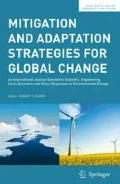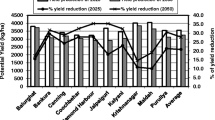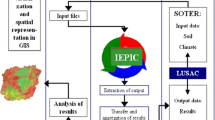Abstract
A simulation study has been carried out using the InfoCrop mustard model to assess the impact of climate change and adaptation gains and to delineate the vulnerable regions for mustard (Brassica juncea (L.) Czernj. Cosson) production in India. On an all India basis, climate change is projected to reduce mustard grain yield by ∼2 % in 2020 (2010–2039), ∼7.9 % in 2050 (2040–2069) and ∼15 % in 2080 (2070–2099) climate scenarios of MIROC3.2.HI (a global climate model) and Providing Regional Climates for Impact Studies (PRECIS, a regional climate model) models, if no adaptation is followed. However, spatiotemporal variations exist for the magnitude of impacts. Yield is projected to reduce in regions with current mean seasonal temperature regimes above 25/10 °C during crop growth. Adapting to climate change through a combination of improved input efficiency, additional fertilizers and adjusting the sowing time of current varieties can increase yield by ∼17 %. With improved varieties, yield can be enhanced by ∼25 % in 2020 climate scenario. But, projected benefits may reduce thereafter. Development of short-duration varieties and improved crop husbandry becomes essential for sustaining mustard yield in future climates. As climatically suitable period for mustard cultivation may reduce in future, short-duration (<130 days) cultivars with 63 % pod filling period will become more adaptable. There is a need to look beyond the suggested adaptation strategy to minimize the yield reduction in net vulnerable regions.








Similar content being viewed by others
References
Aggarwal PK (2008) Global climate change and Indian agriculture: impacts, adaptation and mitigation. Indian J Agric Sci 78:911–919
Aggarwal PK, Kalra N, Chander S et al (2006) InfoCrop: a dynamic simulation model for the assessment of crop yields, losses due to pests, and environmental impact of agro-ecosystems in tropical environments. I. Performance of the model. Agric Syst 89:47–67
AICRPRM (2010) All India Coordinated Research Project on Rapeseed and Mustard Annual Reports 2000-2010, Directorate of Rapeseed-Mustard Research, Bhartpur, India
Alonso A, Perez P, Morcuende R et al (2008) Future CO2 concentrations though not warmer temperatures enhance wheat photosynthesis temperature response. Physiol Plant 132:102–112
Angadi SV, Cutforth HW, Miller PR et al (2000) Response of three Brassica species to high temperature stress during reproductive growth. Can J Plant Sci 80:693–701
Batjes NH (2008) ISRIC-WISE Harmonized Global Soil Profile Dataset (V. 3.1). Report 2008/2, ISRIC-World Soil Information, Wageningen, The Netherlands
Berry PM, Spink JH (2006) A physiological analysis of oilseed rape yields: past and future. J Agric Sci 144(5):381–392
Boomiraj K, Chakrabarti B, Aggarwal PK et al (2010) Assessing the vulnerability of Indian mustard to climate change. Agric Ecosyst Environ 138:265–273
Byjesh K, Naresh Kumar S, Aggarwal PK (2010) Simulating the impacts, potential adaptation and vulnerability of maize to climate change in India. Mitig Adapt Strateg Glob Chang 15:413–431
Challinor AJ, Wheeler TR, Craufurd PQ et al (2007) Adaptation of crops to climate change through genotypic responses to mean and extreme temperatures. Agric Ecosyst Environ 119:190–204
Das L, Annan JD, Hargreaves JC et al (2012) Improvements over three generations of climate model simulations for eastern India. Clim Res 51:201–216
DES (2014) Department of economics and statistics. Ministry of Agriculture, Government of India, India
DOR (2007) Oilseeds situation, a statistical compendium, 2007. Directorate of oil seeds report p 434
DRMR (2011a) Vision-2030, Directorate of rapeseed-mustard research, Bharatpur, Rajesthan, India p 32. http://www.drmr.res.in/publication/DRMR-Vision.pdf
DRMR (2011b) Annual reports, Directorate of Rapeseed and Mustard Research, Bharatpur, Rajasthan, 2000 to 2011
Duivenbooden V, Abdoussallam NS, Mohamed AB (2002) Impact of climate change on agricultural production in the Sahel—part 2. Case study for groundnut and cowpea in Niger. Clim Change 54:349–358
Easterling WE, Aggarwal PK, Batima P et al (2007) Food, fibre and forest products- climate change 2007: impacts, adaptation and vulnerability. In: Parry ML, Canziani OF, Paultikof J, van der Linden PJ, Hanson CE (eds) Contribution of Working Group II to the Fourth Assessment Report of the Intergovernmental Panel on Climate Change. Cambridge University Press, Cambridge, pp 273–313
FAOSTAT (2013) Food and Agriculture Organization of the United Nations. http://faostat.fao.org Accessed 16 Mar 2014
Fischer G, Shah M, van Velthuizen H (2002) Climate Change and Agricultural Vulnerability. International Institute for Applied Systems Analysis. Report prepared under UN Institutional Contract Agreement 1113 for World Summit on Sustainable Development. Laxenburg, Austria
Gadgil S, Rao PRS, Sridhar S (1999) Modelling impact of climate variability on rainfed groundnut. Curr Sci 76:557–569
Gan Y, Angad SV, Cutforth H et al (2004) Canola and mustard response to short periods of temperature and water stress at different developmental stages. Can J Plant Sci 84:697–704
Gomez NV, Miralles DJ (2011) Factors that modify early and late reproductive phases in oilseed rape (Brassica napa L.): its impact on seed yield and oil content. Indian Crop Prod 34:1277–1285
Hall AE (1992) Breeding for heat tolerance. Plant Breed Rev 10:129–168
Ingram JSI, Gregory PJ, Izac AM (2008) The role of agronomic research in climate change and food security. Agric Ecosyst Environ 126:4–12
IPCC (2007) Climate change 2007: climate change impacts adaptation and vulnerability summary for policymakers inter-governmental panel on climate change
IPCC (2013) Climate change 2013: the physical science basis. Summary for policymakers inter-governmental panel on climate change
Jacobs CMJ, DeBruin HAR (1992) The sensitivity of regional transpiration to land surface characteristics: significance of feedback. J Climate 5:683–698
Kimball BA (1983) Carbon dioxide and agricultural yield: an assemblage and analysis of 430 prior observations. Agron J 75:779–786
Kimball BA, Kobayashi K, Bindi M (2002) Responses of agricultural crops to free-air CO2 enrichment. Adv Agron 77:293–368
Kjellstrom C (1993) Comparative growth analysis of Brassica napus and Brassica juncea under Swedish conditions. Can J Plant Sci 73:795–801
Kutcher HR, Warland JS, Brandt SA (2010) Temperature and precipitation effects on canola yields in Saskatchewan, Canada. Agric For Meteorol 150:161–165
Lobell DB, Gourdji SM (2012) The influence of climate change on global crop productivity. Plant Physiol 160:1686–1697
Lobell DB, Schlenker WS, Costa-Roberts J (2011) Climate trends and global crop production since 1980. Science 333:616–620
Long SP, Ainsworth EA, Rogers A et al (2004) Rising atmospheric carbon dioxide: plants face the future. Ann Rev Plant Biol 55:591–628
Long SP, Ainsworth EA, Leakey ADB et al (2005) Global food insecurity. Treatment of major food crops with elevated CO2 or ozone under large scale fully open air conditions suggests recent models may have overestimated future yields. Phil Trans R Soc B 360:2011–2020
Mishra RS, Abdin MZ, Uprety DC (1999) Interactive effects of elevated CO2 and moisture stress on the photosynthesis, water relation and growth of Brassica species. J Agron Crop Sci 182(4):223–230
Morison MJ, Stewart DW (2002) Heat stress during flowering in summer Brassica. Crop Sci 42:797–803
Naresh Kumar S (2011) Climate change and Indian agriculture: current understanding on impacts adaptation vulnerability and mitigation. J Plant Biol 37(2):1–16
Naresh Kumar S, Aggarwal PK (2013) Climate change and coconut plantations in India: impacts and potential adaptation gains. Agric Syst 117:45–54
Naresh Kumar S, Aggarwal PK, Swaroopa Rani DN et al (2011) Impact of climate change on crop productivity in Western Ghats coastal and northeastern regions of India. Curr Sci 101(3):33–42
Naresh Kumar S, Singh AK, Aggarwal PK et al. (2012) Climate change and Indian Agriculture: impact, adaptation and vulnerability. IARI Pub. 32p
Naresh Kumar S, Aggarwal PK, Saxena R et al (2013) An assessment of regional vulnerability of rice to climate change in India. Clim Change 118:683–699
Naresh Kumar S, Aggarwal PK, Swarooparani DN et al (2014) An assessment of regional vulnerability of wheat to climate change in India. Clim Res. doi:10.3354/cr01212
Nuttall WF, Moulin AP, Townley-Smith LJ (1992) Yield response of canola to nitrogen, phosphorus, precipitation and temperature. Agron J 84:765–768
Papantoniou AN, Tsialtas JT, Papakosta DK (2013) Drymatter and nitrogen partitioning and translocation in winter oilseed rape (Brassica napus L.) grown under rainfed Mediterranean conditions. Crop Past Sci 64(2):115–122
Parry ML, Rosenzweig C, Iglesias et al (2004) Effects of climate change on global food production under SRES emissions and socio-economic scenarios. Glob Environ Change 14:53–67
Peltonen-Sainino P, Jauhiainen L, Tranka M et al (2010) Coincidence of variation in yield and climate in Europe. Agric Ecosyst Environ 139:483–489
Rao GU, Jain A, Shivanna KT (1992) Effect of high temperature stress on Bassica pollen: viability, germination and ability to set fruits and seeds. Ann Bot 69:193–198
Rondanini DP, Gomez NV, Agosti MB et al (2012) Global trends of rapeseed grain yield stability and rapeseed-to-wheat yield ration in the last four decades. Eur J Agron 37:56–65
Rosenzweig C, Elliott J, Deryng D et al (2014) Assessing agricultural risks of climate change in the 21st century in a global gridded crop model intercomparison. PNAS www.pnas.org/cgi/doi/10.1073/pnas.1222463110 Accessed 20 June 2014
Rotter R, Van de Geijn SC (1999) Climate change effects on plant growth, crop yield and livestock. Clim Change 43(4):651–681
Rupa Kumar K, Sahai AK, Krishna Kumar K et al (2006) High-resolution climate change scenarios for India for the 21st century. Curr Sci 90:335–345
Salisbury P, Gurung A (2011) Final report oil see Brassica improvement in China, India and Australia. Australian Centre for International Agricultural Research, Canberra, pp 9–10
Tubiello FN, Amthorb JS, Boote KJ et al (2006) Crop response to elevated CO2 and world food supply—a comment on “Food for Thought” by Long et al. Science 312:1918–1921, 2006. Eur J Agron 26:215–223
Uprety DC, Mahalaxmi V (2000) Effect of elevated CO2 and nitrogen nutrition on photosynthesis, growth and carbon nitrogen balance in Brassica juncea. J Agron Crop Sci 184:271–276
Varsheny RK, Bansal KC, Aggarwal PK et al (2011) Agricultural biotechnology for crop improvement in a variable climate: hope or hype? Trends Plant Sci 16:363–371
Wallach D, Makowski D, Jones JW (2006) Working with dynamic crop models. Elsevier Pub. Amsterdam, The Netherlands, p 447
Ware A (2014) Canola variety sowing guide 2014. http://www.sardi.sa.gov.au/__data/assets/pdf_file/0011/45965/Canola_variety_sowing_guide_2014.pdf Accessed 20 June 2014
Ziska LH, Blumenthal DM, Runion GB et al (2011) Invasive species and climate change: an agronomic perspective. Clim Change 105:13–42
Acknowledgment
We are grateful to the Indian Institute of Tropical Meteorology, Pune, for providing the RCM and GCM scenarios and to the Indian Council of Agricultural Research, New Delhi, for funding the Network Project on Climate Change (NPCC) ‘Impact, adaptation and vulnerability of Indian agriculture to climate change’. Part of the work is also carried out under the ‘National Initiative on Climate Resilient Agriculture’ project.
Author information
Authors and Affiliations
Corresponding author
Rights and permissions
About this article
Cite this article
Naresh Kumar, S., Aggarwal, P.K., Uttam, K. et al. Vulnerability of Indian mustard (Brassica juncea (L.) Czernj. Cosson) to climate variability and future adaptation strategies. Mitig Adapt Strateg Glob Change 21, 403–420 (2016). https://doi.org/10.1007/s11027-014-9606-z
Received:
Accepted:
Published:
Issue Date:
DOI: https://doi.org/10.1007/s11027-014-9606-z




